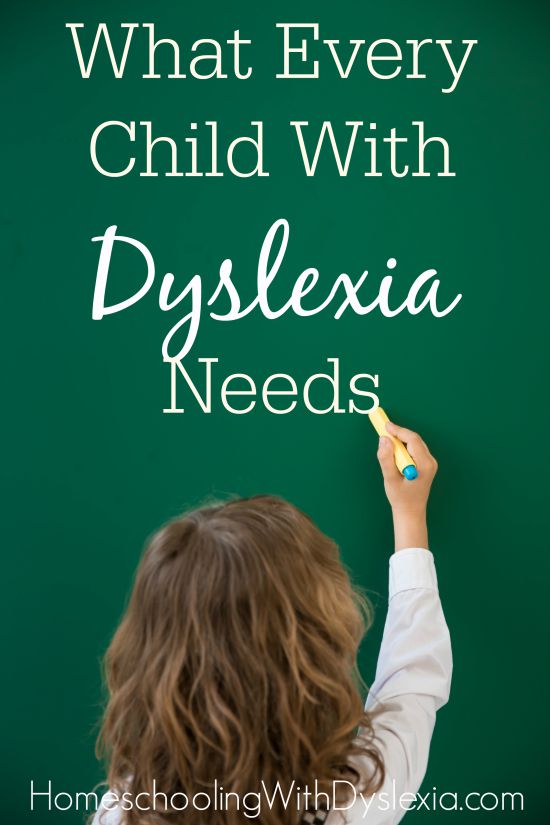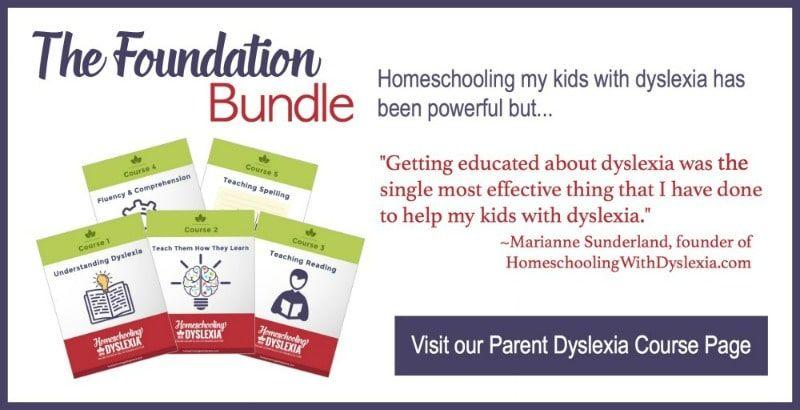We all only have so much time, right? Here’s what you need to focus on with your kids with dyslexia.
There is a LOT of information here on the Homeschooling With Dyslexia site. I am thrilled, after so many years of searching, to be able to create this resource of what I pray is reliable, practical and useful information for parents of kids with dyslexia – whether you are homeschooling or not! I wrote this post on ‘what every child with dyslexia needs’ to help focus our energy on things that will have the biggest impact on our kids.

Every Child With Dyslexia Needs:
To be taught in the way that they learn. Kids (and adults) with dyslexia have average to above-average intelligence. The reason that they struggle so much in the school setting is not that they lack the intelligence, which is a common misunderstanding or myth about dyslexia. People with dyslexia learn differently. This is true across the curriculum – not only with reading instruction.
Dyslexics benefit from teaching methods that are:
- Multi sensory: using more than one of the 5 senses at the same time. This type of learning taps in to more areas of the brain and makes remembering facts and information much, much easier.
- Utilize connected learning: rather than learning subjects in isolation, people with dyslexia benefit from learning subjects in context and connected to other subjects. An example of this might be studying art, science, music, philosophy and literature in the context of history.
- Top down learning: people with dyslexia are global, big-picture thinkers, therefore getting the big picture first before learning the details helps them to have a place to hang details.
- Discussing material: allowing time to have meaningful, reflective discussions about what they are learning. Multiple choice quizzes and paragraphs are a good way for teachers to assess what a child knows but taking time to toss ideas around first, helps the ideas to become more fully understood.
- Learn more about how dyslexics learn by reading this post => How Dyslexics Learn
To understand what dyslexia is. I can’t count the number of adult dyslexics that I’ve talked to who grew up believing that they were stupid because their dyslexia was never addressed. If you’re unsure about telling your child about their own dyslexia, please read this post on Labeling and Dyslexia. Download one of the International Dyslexia Association’s free Dyslexia Fact Sheets – print them and give them to other parents, teachers, friends and family. Help your kids and others to dispel the myths about dyslexia and begin to understand what it really is.
To understand their own learning preferences. A big part of growing up with dyslexia is learning to become advocates for themselves. This entails knowing what dyslexia is as well as how it affects their own learning. No two dyslexics will be exactly alike in their strengths and weaknesses. When a person with dyslexia understands their own unique learning profile, they can begin to find the accommodations that will most benefit them as they experience more and more challenges at school, college and work. They will also be better able to discuss their needs with teachers, professors and employers.
To have time to pursue their interests and abilities – and not be taken out of sports because their grades aren’t good enough, especially when sports is one of their talents or gifts. My husband was an excellent athlete growing up dyslexic in England. He credits his positive experiences with sports as being the thing that kept him going through a very frustrating and difficult school experience. Where ever a child’s talents lie, be sure to allow time to pursue and improve in those areas. Not only will this build confidence, it may be where their career lies.
Have at least one caring adult to take an interest in them, believe in them and to walk the road of learning about dyslexia – both it’s strengths and weaknesses. Research on successful people with dyslexia has determined that the one most significant factor that impacted their success was the presence of at least one caring adult in their lives. This adult advocated for them and believed in them until they finally were able to do it for themselves. Since you are reading this, there is a strong chance that you may be that person in a child’s life.
Get Educated
It’s Here! Our latest course. Course 6: Help for the Hopelessly Unorganized Child: Understanding Executive Function.
For more posts on Understanding Dyslexia, visit the blog category – Understanding Dyslexia.






This is so helpful. Thank you for sharing both the research and the practical tips for everyday life with a dyslexic child. That is why I love your work so much! I feel confident in the approach and encouraged as a mom, all at the same time.
I strongly agree with your point “Top down learning”. Being a special needs teacher at Winston Preparatory School I have seen many children, having short term memory problems, in the absence of a big picture various aspects of sequential tasks cause great difficulties. It is important to help dyslexic students discover their personal learning style. While teaching them, our focus was on helping them to process information and perform new skills with greater understanding.
These are such great suggestions! I particularly love your tips around demystifying how your child learns — both using a specific term for some of the challenges, and also focusing on the strengths and affinities. Well done!
Do you have anything for helping your child with dysgraphia?
good day for this information, i am 44 but i was only diagnosed of having dyslexia when i was in my early 20’s. on a usual bases it takes someone 10- 12 years to complete your schooling from grade R- grade 12 but for me it 16 years. i was called any name mentionable and i started to believe it. when they found out what was “wrong” with me it got better and i wanted to study further after a 13 year gap i decided to study it was hard but i achieved top in my university class for my teaching course. today i am a qualified proud teacher and i see signs of children of how i was when i was at school, i offer my time and service to children who are willing to learn or who want to learn due to their condition, most parents dont want to admit that their children are dyslexic they say bad words which i dont allow to be said i encourage them as i encourage myself to study to help as i now when dyslexia wasnt diagnosed and people didnt know better but now i can try to help, some of my students do find it hard but i am their, using my time to give them hope and letting them know that there are many people who have dyslexia and they are famous and they like us just have to put in that extra effort and we will get there. maybe even get it more than the usuals.
Thanks for sharing some of your story Hazel!
I read so many things about dyslexia, I truly believe my son has it, but because he actually got better in reading his teacher doesn’t think so, I have search but can’t figure out where to go to get him tested , can anyone who reads this give me an idea. Thank you
Hi Mel. Here is a post I wrote on testing: https://dev.homeschoolingwithdyslexia.com/homeschooling-with-dyslexia-get-testing/